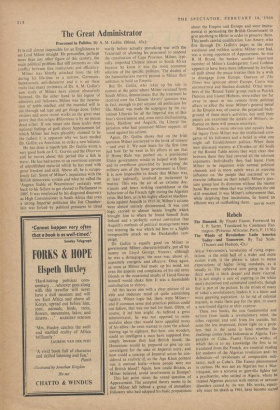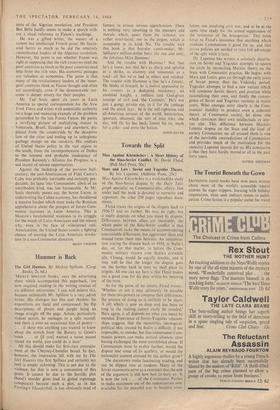Rebels
The Damned. By Frantz Fanon. Foreword by J. P. Sartre. Translated by Constance Far- rington. (Presence Africaine, Paris, F. 13.50.) The Winds of Revolution: Latin America Today—and Tomorrow. By Tad Szulc. (Thames and Hudson, 42s.)
ADLAI STEVENSON'S 'revolution of rising expec- tations' is the mild half of a wider and more violent truth, if the phrase is taken to mean expectations of higher living standards, as it usually is. The upheaval now going on in the third world is bOth deeper and more visceral. It is not simply a case of aspiring to the white man's motorised and automated comforts, though that is part of the picture. In the minds of many of today's revolutionary leaders it is a bitter and more gnawing aspiration : to be rid of colonial masters, to make them pay for the past, to assert a new-found dignity at their expense.
These two books, the one fundamental and written from inside a revolutionary mind, the other regional and told from the outside, but none the less important, throw light on a prob- lem that is the same in kind whether the challenge comes from Indonesia or Algeria, Tan- ganyika or Cuba. Frantz Fanon's works, of which this is to my knowledge the first to be translated from the French, are essential reading for students of the Algerian revolution and—by definition—of revolutions of comparable mili- tancy, such as Cuba's. The Fanon phenomenon is curious. He was not an Algerian but a Mar- tiniquais, not a terrorist or guerrilla fighter but a psychiatrist, who settled in Algeria, where he treated Algerian patients with mental or nervous disorders caused by the war. His works, especi- ally since his death in 1961, have become sacred
texts. of the Algerian revolution, and President Ben Bella hardly seems to make a speech with- out a ritual reference to Fanon's teachings.
He was a gifted writer, the master of a violent but intellectual French prose. He fascin- ated Sartre as much as he did the relatively unintellectual leaders of the Algerian revolution. However, the point is not whether Fanon was right in supposing that the rich countries need the poor countries as much as the poor countries need help from the rich ones. His economic passages are valueless as economics. The point is that many of the revolutionary leaders of the 'emer- gent' countries think as Fanon thought and often act accordingly, even if the 'demonstrable out- come is deeper misery, for their peoples.
Mr. Tad Szulc spent six years in Latin America as special correspondent for the New York Times and writes with undeniable authority on a huge and menacing example of the problem personified by the late Frantz Fanon. He paints a terrifying picture of multiplying masses in Venezuela, Brazil, Ecuador and elsewhere, dis- placed from the countryside by the deceptive lure of the cities and ending up in unhygienic garbage dumps on the outskirts. His analysis of United States policy in the vast region to the south, from the incomprehension of Dulles to the lateness and probable inadequacy of ,,resident Kennedy's Alliance for Progress, is a sad record of missed opportunities.
Against the backdrop of the previous half- century, the anti-Americanism of Fidel Castro's Cuba was probably inevitable and certainly pre- dictable. Its lapse into Communism; albeit of an unorthodox kind, was less foreseeable. As Mr. Szulc shrewdly points out, the Soviet Union, in underwriting the Cuban economy, has shouldered a massive burden which must make the Russians apprehensive about the prospect of future Com- munist successes in Latin America. This is Moscow's fundamental weakness in its struggle for the minds of Latin Americans and the reason why, even in the face of widespread anti- Americanism, the United States retains a fighting chance of steering the Latin American revolu- tion in a non-Communist direction.
BRIAN CROZIER



































 Previous page
Previous page